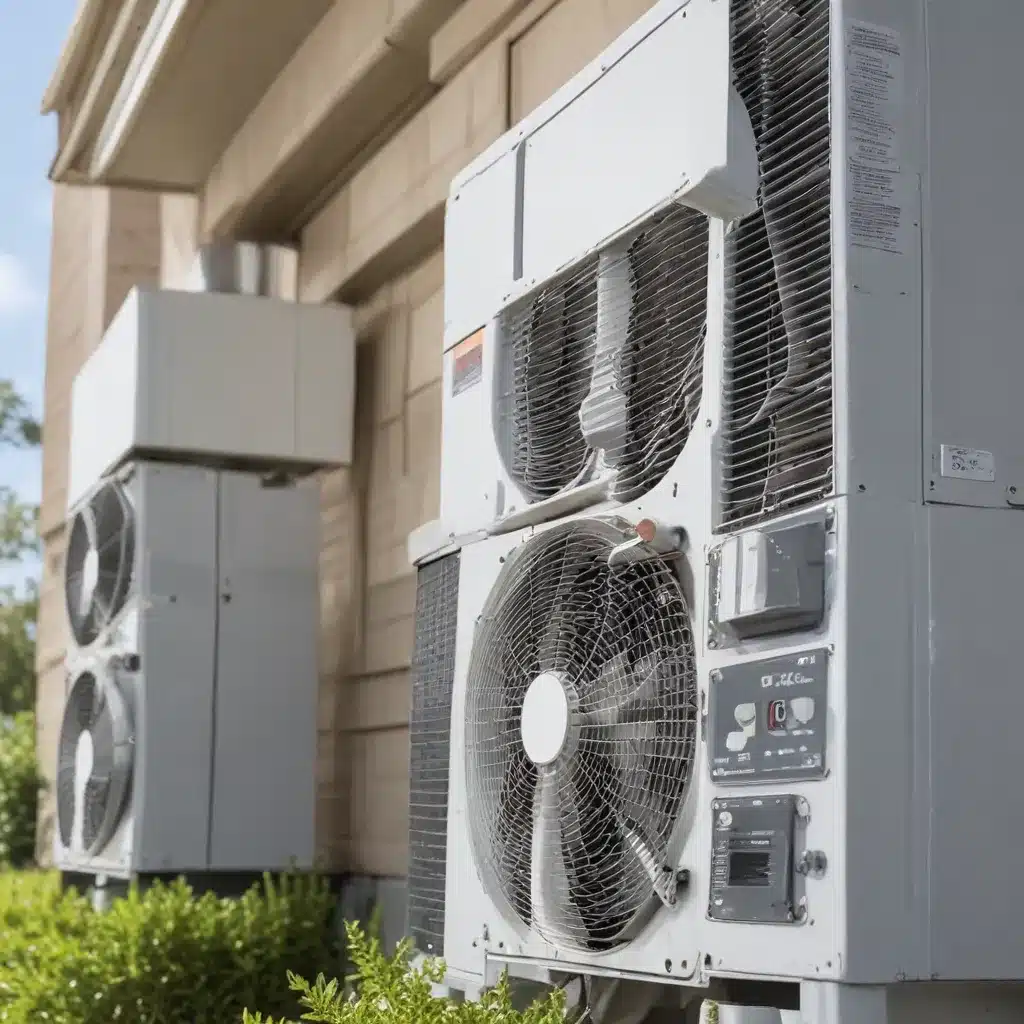
As an experienced air conditioning specialist, I’ve had the privilege of working with countless homeowners and businesses to optimize their climate control solutions. Over the years, I’ve witnessed the remarkable advancements in HVAC (Heating, Ventilation, and Air Conditioning) technology, and I’m excited to share my insights on a topic that’s become increasingly important: mitigating the environmental impact of HVAC systems.
Embracing Hybrid HVAC Systems for Optimal Efficiency
One of the most promising developments in the industry is the rise of hybrid HVAC systems. These innovative solutions combine the reliability of traditional heating and cooling methods with the energy-efficient features of modern heat pumps and smart controls. By intelligently switching between various components based on external conditions and energy demands, hybrid HVAC systems ensure an optimal balance between comfort and cost-effectiveness.
A defining characteristic of these systems is their utilization of dual heating sources. Traditional furnaces, often fueled by natural gas, provide robust heating during colder periods, while the heat pump, operating on electricity, offers an eco-friendly alternative by extracting heat from the air or ground. This dual-heating approach not only enhances adaptability but also contributes to significant energy savings and a more sustainable heating solution.
Harnessing the Versatility of Heat Pumps
Another key feature of hybrid HVAC systems is their cooling capabilities, made possible through the incorporation of a versatile heat pump. During warmer seasons, the heat pump seamlessly transitions to its cooling mode, extracting heat from indoor air and expelling it outside. This dual functionality eliminates the need for a separate air conditioning unit, streamlining the overall HVAC system and promoting energy efficiency.
The ability to efficiently cool spaces further enhances the system’s versatility, making it an all-encompassing solution for temperature control throughout diverse climatic conditions. By leveraging the heat pump for both heating and cooling, hybrid HVAC systems contribute to a more sustainable approach to indoor climate management.
Optimizing Energy Efficiency with Smart Controls
A hallmark feature of modern hybrid HVAC systems is the integration of smart control systems. These sophisticated controls employ advanced algorithms and sensors to monitor indoor and outdoor conditions, optimizing the system’s performance. Smart thermostats allow users to program heating and cooling schedules, set preferences remotely via mobile devices, and even learn from user behavior to enhance energy efficiency.
By providing real-time data and insights, smart control systems empower users to make informed decisions about their HVAC settings, contributing to both comfort and energy savings. This integration of intelligent technology adds a layer of adaptability and user convenience, aligning the hybrid HVAC system with the demands of a modern, connected lifestyle.
Minimizing Environmental Impact: A Sustainable Approach
As concerns for environmental sustainability grow, hybrid HVAC systems emerge as a promising solution for homeowners and businesses alike. The incorporation of heat pump technology, which relies primarily on electricity and renewable energy sources, produces fewer greenhouse gas emissions compared to traditional heating systems that rely on fossil fuels.
Hybrid HVAC systems also feature adaptive defrost control mechanisms, which intelligently monitor conditions and adjust the defrost cycle to prevent unnecessary energy consumption. This ensures that the heat pump remains effective even in colder climates, further enhancing its environmental credentials.
Moreover, the emphasis on energy efficiency inherent in hybrid HVAC systems translates to significant cost savings over time. The reduction in energy consumption not only benefits the pocketbook but also aligns with the broader goal of environmental responsibility. By choosing a hybrid HVAC system, homeowners and businesses can make a tangible contribution to reducing their carbon footprint and supporting a more sustainable future.
Ensuring Quiet and Comfortable Operations
Another notable feature of hybrid HVAC systems is their emphasis on quiet operation. Advanced engineering and design considerations aim to minimize noise levels during both heating and cooling cycles, providing a comfortable indoor environment without compromising on acoustics.
This focus on quiet operation is particularly beneficial for residential settings, where noise from HVAC systems can be a significant concern. By incorporating sound-dampening technologies and optimizing fan and compressor performance, hybrid systems offer a peaceful and distraction-free living or working space, enhancing the overall user experience.
Adaptability Across Diverse Climates
One of the standout features of hybrid HVAC systems is their versatility across diverse climate conditions. Traditional heating and cooling systems may struggle to maintain efficiency in extreme temperatures, but the dual-heating sources and adaptability of the heat pump in hybrid systems address this limitation.
The traditional furnace provides robust heating during colder periods, while the heat pump excels in moderate temperatures, offering consistent comfort throughout the seasons. This versatility makes hybrid systems suitable for regions experiencing a wide range of weather patterns, providing homeowners and businesses with reliable and efficient climate control year-round.
Investing in a Sustainable Future
As an air conditioning specialist, I’ve witnessed firsthand the evolution of HVAC systems and the growing emphasis on environmental sustainability. Hybrid HVAC systems represent a significant step forward in this regard, combining advanced technology, energy efficiency, and a reduced carbon footprint.
By choosing a hybrid HVAC system, homeowners and businesses can not only enjoy superior comfort and cost-effective climate control but also contribute to a more sustainable future. The integration of smart controls, the utilization of renewable energy sources, and the overall emphasis on efficiency all contribute to a holistic approach to indoor climate management.
Ultimately, the hybrid HVAC system stands as a testament to the industry’s commitment to innovation and environmental responsibility. As we navigate the challenges of climate change and the ever-increasing demand for sustainable solutions, I’m excited to see the continued advancements in this technology and the positive impact it can have on our homes, our businesses, and our planet.
If you’re in the market for a new HVAC system or considering an upgrade, I highly recommend exploring the benefits of a hybrid system. Visit our website at https://www.hamiltonaircon.co.uk/ to learn more about our comprehensive solutions and how we can help you achieve optimal comfort and energy efficiency while minimizing your environmental footprint. Together, let’s work towards a more sustainable future for all.